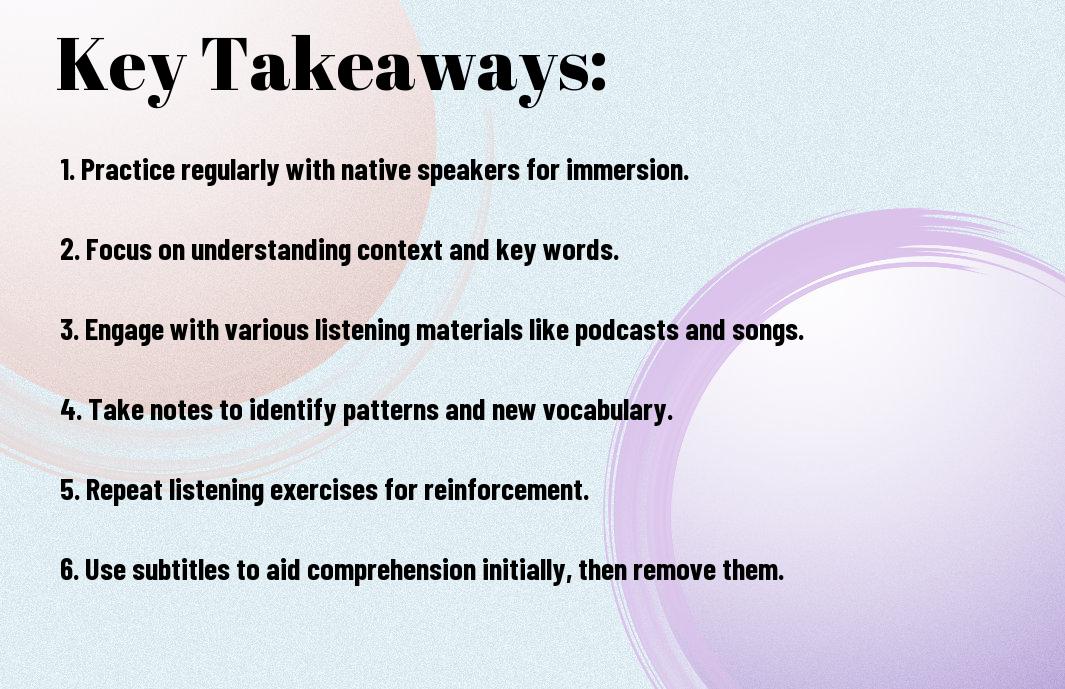Just imagine being able to effortlessly pick up on conversations in a new language, understanding native speakers with ease. To achieve this level of language proficiency, honing your listening skills is key. In this guide, you will discover the best practices recommended by language experts to help you develop your listening abilities in a new language. By incorporating these strategies into your language learning routine, you will be on your way to becoming a proficient listener in no time.

Key Takeaways:
- Consistent Practice: Regular and consistent practice is necessary for developing listening skills in a new language.
- Exposure to Authentic Material: Listening to authentic materials such as podcasts, movies, and music can help improve comprehension and pronunciation.
- Active Listening: Engage in active listening by taking notes, repeating phrases, and practicing speaking in response to what you hear.

Setting the Foundation
Before entering into the specifics of developing your listening skills in a new language, it’s important to establish a strong foundation for your learning journey. Check out this resource on How to Improve Your Listening Skills as a Language Learner for some valuable insights and strategies to get you started.
Identifying Your Learning Style
The first step in developing your listening skills is identifying your unique learning style. Are you someone who learns best through visual aids, hands-on experiences, or auditory cues? Understanding how you absorb information most effectively can help you tailor your language learning approach to suit your preferences and maximize your progress.
Creating a Language Learning Environment
For creating a conducive language learning environment, consider immersing yourself in the language as much as possible. Surround yourself with resources in your target language, such as books, music, movies, and podcasts. Additionally, seek out language exchange partners or online communities where you can practice listening and speaking with native speakers. By integrating the language into your daily life, you can make significant strides in improving your listening skills.
Style and consistency are key when it comes to developing your listening skills in a new language. Find what works best for you and make a concerted effort to engage with the language regularly. The more you expose yourself to the language, the more comfortable and proficient you will become in listening and understanding it.
Building Blocks of Listening
Phonetics and Phonology
Some of the imperative building blocks of developing listening skills in a new language are understanding phonetics and phonology. The ability to recognize and reproduce the sounds of a language is crucial for comprehension. By familiarizing yourself with the pronunciation rules and patterns of the language, you can improve your listening skills significantly. Pay attention to the different sounds and intonations used in the language, and practice mimicking them to enhance your understanding.
Grammar and Sentence Structure
To further strengthen your listening abilities, you need to grasp the grammar and sentence structure of the language. The way sentences are constructed, the use of tenses, and the order of words all play a vital role in how you interpret spoken language. By developing a solid foundation in grammar, you can better comprehend conversations and follow along more easily.
With a firm understanding of grammar and sentence structure, you can anticipate the flow of conversations and fill in gaps more effectively. This predictive ability will help you catch key information and contextual clues while listening to a new language.
Vocabulary Acquisition
With an extensive vocabulary, you can enhance your listening skills by understanding a wider range of words and expressions used in conversations. Building your vocabulary is an ongoing process that involves learning and practicing new words regularly. Make use of flashcards, language learning apps, and vocabulary lists to expand your word bank and improve your comprehension.
Structure your vocabulary learning around different themes or topics to make it more relevant and engaging. By associating words with specific contexts, you can better remember and utilize them in conversations, which will ultimately boost your listening skills in the new language.

Active Listening Strategies
For effective language learning, it is vital to develop your listening skills actively. This involves not just hearing the words being spoken but actively engaging with the content to understand and absorb the language. Here are some strategies to enhance your active listening abilities.
Focused Attention
Listening with focused attention means concentrating solely on the speaker and the message they are conveying. Eliminate distractions, such as background noise or electronic devices, and give your full focus to the speaker. This practice allows you to better comprehend the language being spoken and pick up on nuances in tone and pronunciation.
Note-Taking Techniques
Effective note-taking can significantly improve your retention and understanding of the language. Techniques like jotting down keywords, main ideas, or important details while listening can help you remember and review the information later. This practice reinforces your memory and aids in connecting spoken words to written form.
It is crucial to develop a shorthand system that works for you, allowing you to capture vital points quickly without getting bogged down in transcribing every word.
Summarizing and Paraphrasing
Summarizing and paraphrasing what you have heard is an excellent way to check your understanding and reinforce your grasp of the language. After listening to a passage or conversation, try to condense the key points in your own words. This process not only helps you internalize the information but also improves your ability to express ideas in the new language.
The practice of summarizing and paraphrasing encourages active engagement with the language and enhances your listening comprehension skills over time.
Immersion and Authentic Materials
Your journey to developing strong listening skills in a new language can be greatly enhanced through immersion and the use of authentic materials. By immersing yourself in the language and exposing yourself to materials created by native speakers, you can improve your comprehension and fluency significantly.
Listening to Native Speakers
For the most authentic language experience, make it a habit to listen to native speakers. Whether it’s watching movies, listening to music, or engaging in conversations with native speakers, exposing yourself to the natural cadence and pronunciation of the language will help you tune your ear to the nuances of speech.
Podcasts, Audiobooks, and Videos
The use of podcasts, audiobooks, and videos in the target language can be invaluable in improving your listening skills. These resources provide you with real-life content and different accents, helping you train your ear to understand various speech patterns and vocabulary. You can listen to these materials during your daily commute, while exercising, or as part of your bedtime routine.
It’s also beneficial to choose content that aligns with your interests, as this will keep you engaged and motivated to continue listening regularly.
Music and Song Lyrics
An enjoyable way to enhance your listening skills is by listening to music in the language you are learning and following along with the lyrics. Music offers a rhythmic and melodic way to absorb the language, and by reading and understanding the lyrics, you can improve your vocabulary and comprehension.
To fully immerse yourself in the language, try translating the lyrics into your native language and then back into the target language. This exercise can help you grasp the intended meaning behind the words and phrases used in the songs.
Overcoming Common Challenges
Once again, developing listening skills in a new language comes with its fair share of challenges. Here are some common obstacles you may encounter and tips on how to overcome them.
Dealing with Accents and Dialects
With the vast array of accents and dialects present in the world, it’s natural to find it difficult to understand native speakers of a new language. One way to tackle this challenge is by exposing yourself to various accents through movies, TV shows, podcasts, and music in the target language. By immersing yourself in different accents, you can train your ear to become more attuned to the nuances of pronunciation.
Managing Background Noise and Distractions
One common difficulty in developing listening skills is dealing with background noise and distractions. If you find yourself struggling to focus during listening practice, try to create a quiet and conducive environment for learning. Find a noise-free space where you can fully concentrate on the audio materials. Additionally, using noise-canceling headphones can help minimize external distractions and enhance your listening experience.
This subsection elaborates on the importance of creating a conducive learning environment for improving your listening skills. By removing distractions and focusing solely on the audio material, you can better train your ears to pick up nuances in pronunciation, intonation, and vocabulary.
Building Confidence in Your Listening Skills
For many language learners, lack of confidence in their listening abilities can be a significant barrier to progress. To build confidence in your listening skills, start by setting achievable goals for regular listening practice. Choose materials that suit your current proficiency level and gradually challenge yourself with more complex content as you improve. Consistent practice and exposure to the language will help you gain confidence in your listening abilities over time.
Confidence plays a crucial role in language learning, especially when it comes to developing listening skills. By setting realistic goals, staying dedicated to practice, and celebrating small victories along the way, you can boost your confidence and become a more adept listener in your target language.
Practice and Reinforcement
Many language experts agree that consistent practice is key to developing strong listening skills in a new language. Regular listening exercises can help you improve your comprehension and speed of understanding.
Regular Listening Exercises
Any opportunity to incorporate listening practice into your daily routine is beneficial. Whether you choose to listen to podcasts during your commute, music in the background while you work, or audiobooks before bed, exposing yourself to the language regularly is crucial. Additionally, using language learning apps that offer listening exercises can provide targeted practice to help you improve specific aspects of your listening skills.
Conversational Partners and Language Exchange
The best way to enhance your listening skills is by engaging in conversations with fluent speakers of the language. Utilizing conversational partners or language exchange programs can provide you with real-world listening practice in a supportive environment. By actively listening to and engaging with native speakers, you can improve your comprehension, vocabulary, and overall fluency in the language.
The benefit of conversational partners and language exchange programs is the opportunity they provide for you to practice listening in a natural, conversational setting. This can help you become more comfortable with the cadence and rhythm of the language, as well as expose you to different accents and speech patterns.
Self-Assessment and Progress Tracking
Partners
Self-assessment tools can be valuable for tracking your progress in developing listening skills. By regularly evaluating your listening comprehension through quizzes, practice exercises, or even recording yourself speaking and listening back, you can identify areas for improvement and track your growth over time. Setting specific goals for your listening skills and monitoring your progress can help keep you motivated and focused on your language learning journey.
Self-Assessment and Progress Tracking
Exchange
Tracking your listening skills development allows you to see how far you’ve come and where you still need to improve. It provides a tangible way to measure your progress and can highlight the effectiveness of different learning strategies. Regularly assessing and tracking your listening skills can help you stay engaged and motivated as you work towards achieving fluency in the language.
To wrap up
Presently, you have learned about the best practices for developing listening skills in a new language. By focusing on active listening, exposing yourself to authentic materials, practicing regularly, and using targeted techniques such as shadowing, you can improve your comprehension and fluency in a foreign language. To research deeper into the importance of listening skills, you may want to explore A Manifesto for Better Listening Skills In A Foreign Language.
Be mindful of, learning a new language is a journey that requires dedication and perseverance. Incorporating these best practices into your language learning routine will help you become a more effective listener and communicator in your target language. Embrace the process, stay consistent, and celebrate your progress along the way. Keep listening, keep learning, and you will see improvement over time. Bonne chance! (Good luck!)
FAQ
Q: What are the best practices for developing listening skills in a new language?
A: To improve listening skills in a new language, it’s important to listen to authentic materials such as podcasts, music, or TV shows in that language. Additionally, you can practice active listening by taking notes, focusing on specific sounds or accents, and trying to understand the context of what is being said.
Q: How can I make the most of language learning resources to enhance my listening skills?
A: Make use of a variety of resources such as language learning apps, online courses, and language exchange programs to expose yourself to different accents, dialects, and speaking speeds. Practice listening to materials at different difficulty levels to challenge yourself and gradually improve your comprehension skills.
Q: Are there any specific strategies I can use to effectively practice and improve my listening skills?
A: Some effective strategies for improving listening skills include listening to the same material multiple times to catch details you might have missed, engaging in conversations with native speakers to practice real-life listening scenarios, and using subtitles or transcripts to enhance your understanding of spoken language.

